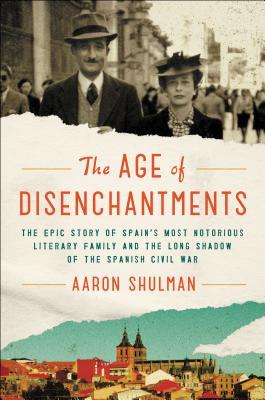
The Age of Disenchantments
The Epic Story of Spain's Most Notorious Literary Family and the Long Shadow of the Spanish Civil War
کتاب های مرتبط
- اطلاعات
- نقد و بررسی
- دیدگاه کاربران
نقد و بررسی

January 1, 2019
A prominent literary family reflects Spain's tumultuous past.Making his book debut, journalist Shulman creates a deeply researched portrait of the Paneros, one of Spain's most notorious families: patriarch Leopoldo (1909-1962), a well-regarded poet during the Franco dictatorship; his unhappy wife, Felicidad; and his three tormented sons. The author's fascination with the family began in 2012, when he watched El desencanto, a documentary made in 1976, in which Felicidad and her adult sons spoke candidly about their relationships with Leopoldo and one another, revealing anger, bitterness, and loneliness. The movie elevated the Paneros "into a cultural phenomenon," Shulman writes, and sparked his own interest in the family's "refreshing weirdness, poetic obsessions, and sacrilegious taste for destruction." He is not alone in responding to their "lasting magnetism." They have inspired academic studies, fiction, poetry, songs, films, memoirs, volumes of correspondence, and republication of their own works--"a literary subgenre unto themselves." Central to the family's story is the question of Leopoldo's commitment to fascism. Like others of his generation, he chose "survival over principles" in supporting Franco, "warts and all." As a well-respected poet, he knew that Spain needed cultured men "to burnish the country's reputation--and to defend it, a cause he assiduously took up." He served as a censor, took a diplomatic post in London (where he befriended T.S. Eliot), directed a government-sponsored literary magazine, convened literary conferences, and became editorial director of the Spanish Reader's Digest. If his political stance enraged the likes of Pablo Neruda, who attacked him as "a Francoist executioner," in Spain his reputation flourished. A success professionally, his personal life was a mess. He was, Shulman reveals, "a cryptic, complicated, and often difficult man, and his personality and the power he wielded over his family left a profound mark on his wife and children." Felicidad felt unloved and oppressed; his sons, beset by their own demons, failed to achieve the literary success to which they aspired. Spain's roiling history, beginning in the 1930s, forms the backdrop to the family's turmoil.A richly detailed history chronicles a family's pain.
COPYRIGHT(2019) Kirkus Reviews, ALL RIGHTS RESERVED.

February 1, 2019
In his first book, journalist Shulman shadows the Panero literary family through the Spanish Civil War (1936-39), the dictatorship of Francisco Franco (1939-75), and the democratic era that followed. Unknown in the English-speaking world, the Paneros were famous in Spain. Leopoldo Panero was the unofficial poet laureate of Franco's regime, denounced by many as a fascist collaborator. He doubled as a domineering patriarch according to wife Felicidad and three sons, all of whom became poets in their own rights: Juan Luis, Leopoldo María, and Michi. Leopoldo María helped unleash a radical artistic movement called the novísimos ("newest ones"). But the Paneros scandalized Spain when they sat for the 1973 documentary El desencanto ("The Disenchantment"). On camera, they excoriated the elder Leopoldo and one another, trading accusations of malice and cowardice. Their family saga provides insight into 20th-century Spain, torn between dictatorship and democracy. VERDICT Part history, part melodrama, and sure to entertain public library patrons attracted to family biographies or Spain.--Michael Rodriguez, Univ. of Connecticut, Storrs
Copyright 2019 Library Journal, LLC Used with permission.

























دیدگاه کاربران